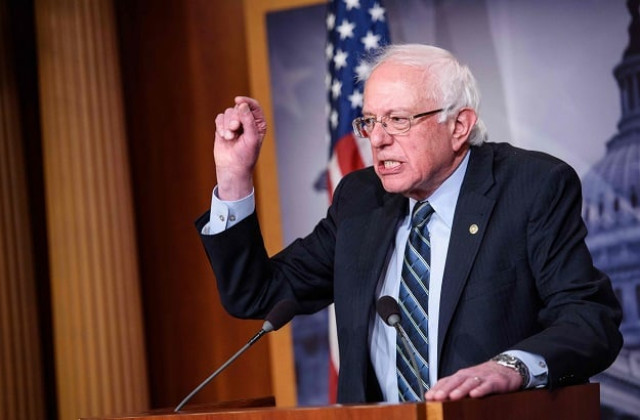Bernie Sanders: a troubling favourite for the Democrats in 2020?
Sanders tops list of 18 candidates formally vying for the Democratic nomination

Senator Bernie Sanders. PHOTO: AFP
Today, he is once again in the hunt for the US presidency, and atop the list of 18 candidates formally vying for the Democratic nomination.
But his early lead could prove to be divisive as the party seeks to oust Donald Trump from the Oval Office in 2020. Sanders, a 77-year-old self-described Democratic socialist from Vermont, is so far running from a position of strength, even as fresh new faces like 'Mayor Pete' Buttigieg are making headlines.
Of course, the Wall Street foe is still running second in opinion polls to 76-year-old former vice president Joe Biden, who hasn't officially thrown his hat in the ring.
Bernie Sanders faces new challenges in crowded 2020 US presidential race
But fans of Sanders, who favours universal health care and steep taxes on the wealthy, are on board once again, if donations are any indication.
He has more than $18 million in his campaign war chest so far, more than any other Democrat in the race. And most of those donations -- 84 per cent -- were less than $200.
Sanders seems ready for the fight -- he held a high-energy town hall meeting on Fox News Monday night, which other Democrats have shunned, and earned praise for his efforts.
Trump, who is known to spend a fair bit of time watching the channel, even commented on his performance.
"I believe it will be Crazy Bernie Sanders vs. Sleepy Joe Biden as the two finalists" for the Democrats, Trump tweeted. "I look forward to facing whoever it may be."
But for Ester Fuchs, a professor of political science at Columbia University in New York, that outcome is far from being a certainty.
"It is so early," Fuchs told AFP.
"He has high name recognition, which affects his standing in the polls, which also affects fundraising."
But even if Democratic voters are leaning more to the left than before, Fuchs believes the younger, more moderate candidates like former Texas congressman Beto O'Rourke, California senator Kamala Harris and Buttigieg, the mayor of South Bend, are "going to blow him out of the water."
And this time around, the media -- which gave Sanders 'a free ride' in 2016, Fuchs says, because "nobody took him seriously" -- are not going to be as forgiving.
While Sanders is well positioned for now, and a win in the primaries would not exactly be a shock, it's too early to talk about a frontrunner, says Kyle Kondik, an analyst at the University of Virginia Center for Politics.
For Kondik, the key to Sanders' eventual success will be if he can rally support beyond his traditional support base.
"Once the field gets smaller, will he grow his support or stagnate?" Kondik said. "I am just not positive that the party is going to rally around him."
Bernie Sanders announces he is running for US president
Of course, Sanders is not technically a Democrat -- he's an independent who caucuses with Democrats on Capitol Hill and only wears the party's stripes for primary purposes, analysts note.
If he remains ahead of the pack, a 'Never Bernie' movement -- similar to one that sprouted up in the Republican Party against Trump in 2016 -- could take root, Kondik says.
But on the flip side, if he fails once again to win the nomination, "it is not clear that he will step up and rally to support the standard-bearer," Fuchs says.
Indeed, the party's establishment is still bitter about his last run, believing that his supporters failed to sufficiently back Clinton in her battle with Trump. This time around, that could happen again.
One thing is for sure: Sanders will try to turn the hostility towards him emanating from the party's upper echelons into a political asset.
In a fundraising message Wednesday, he slammed "some of the wealthiest members of the political establishment" for "plotting how to defeat our political revolution."



















COMMENTS
Comments are moderated and generally will be posted if they are on-topic and not abusive.
For more information, please see our Comments FAQ